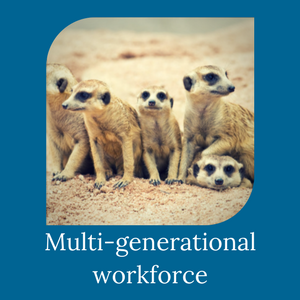 Multi-generational workforce refers to managing four generations of employees in the workforce, which we are experiencing for the first time in history. There isn’t a consensus of the exact birth dates that define each generation, but they are generally broken in to the following four groups:
Multi-generational workforce refers to managing four generations of employees in the workforce, which we are experiencing for the first time in history. There isn’t a consensus of the exact birth dates that define each generation, but they are generally broken in to the following four groups:
- Traditionalists, 1922-1945 – grew up in a ‘do without’ era
- Baby Boomers, 1946-1964 – grew up in a healthy economic era
- Generation X, 1965-1978 – grew up in an era of distrust for national institutions
- Generation Y, 1979-1997 – grew up in an era of financial boom.
We also have the emerging Generation Z, but in this blog our focus is the first four groups.
For employers, managing the needs and expectations of four such distinctly unique groups in the same workplace, can prove to be very challenging. So how can you ensure that you are supporting and engaging your multi-generational workforce?
Unique groups
Broadly speaking each of the four groups have the following traits which are frequently attributed in defining them:
- Traditionalists - believes in hard-work and sacrifice and are uncomfortable with change
- Baby Boomers - optimistic, defined by their job, workaholic
- Generation X - cynical, work-life balance, self-reliant, comfortable with change
- Generation Y - tech-savvy, comfortable with multi-tasking, self-entitled.
Each generation has experienced different cultural backgrounds, goals, life influences and behaviours, therefore these definitions can help you as an employer to understand and identify what factors may drive your workforce. Each generation is at a different stage in their lives and will have their own expectations, priorities and approaches to work, and life in general.
As an employer, you need to make sure that you and your managers are aware of each generation and the best practice for recruitment, retention, managing styles, rewards, training etc. for each of these generations.
For example, research shows that different generations have different preferences towards training and how they are communicated to. Generation X and Y have a preference towards learning independently and computer based or internet training. Traditionalists and Baby Boomers have a preference to more traditional classroom or paper-based learning.
In terms of communication, Generation X like instant messages and tweets, whilst Baby Boomers and older Generation Y’s prefer phone calls and emails. Employers need to think how best to communicate and reach all of their workforce, and understand that each generation values different styles.
When these practices are managed well your business will have a competitive edge, as by recognising the differences and utilising the talents and skills of each generation you will drive their performance.
Negative stereotypes
Avoid negative stereotypes, instead see each employee as an individual. Acknowledge their differences and support these differences. But don’t assume a ‘traditionalist’ is simply waiting to retire and has no desire for training or on the job learning. Equally don’t tag generation Y as the ‘me, me, me’ generation who are self-entitled.
It’s important that whilst acknowledging these traits and types that you don’t let them solely define an individual. By promoting respect across the generations in your organisation, you will create a culture of acceptance and inclusiveness. With this respect, your workforce will understand that everyone comes with a different set of skills and that their contributions are equally valued.
Embracing your multi-generational workforce
When you have a multi-generational team, it is important that you help each generation to understand each other in order for them to work cohesively and effectively together. Highlight each person’s skills and how this benefits the team, placing value on all of the skills. A multi-generational workforce brings experience and innovation to an organisation, as it builds a team with diverse perspectives, insights and strengths.